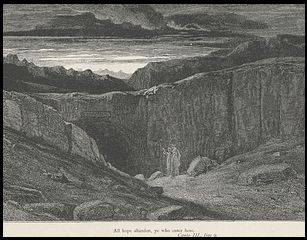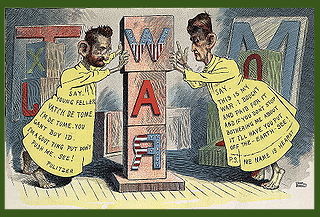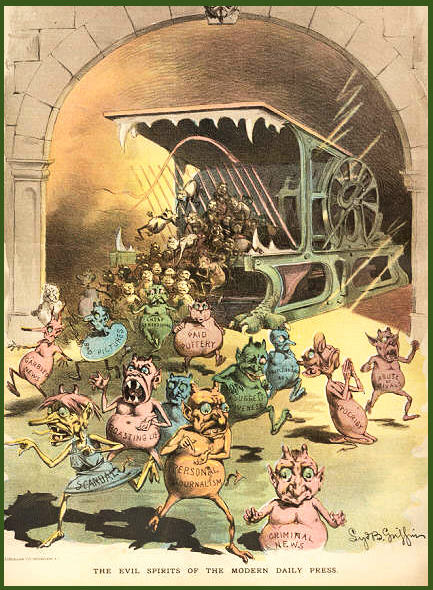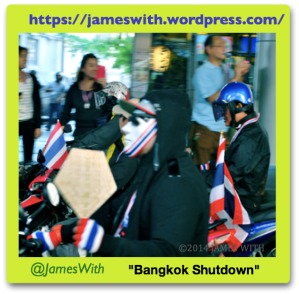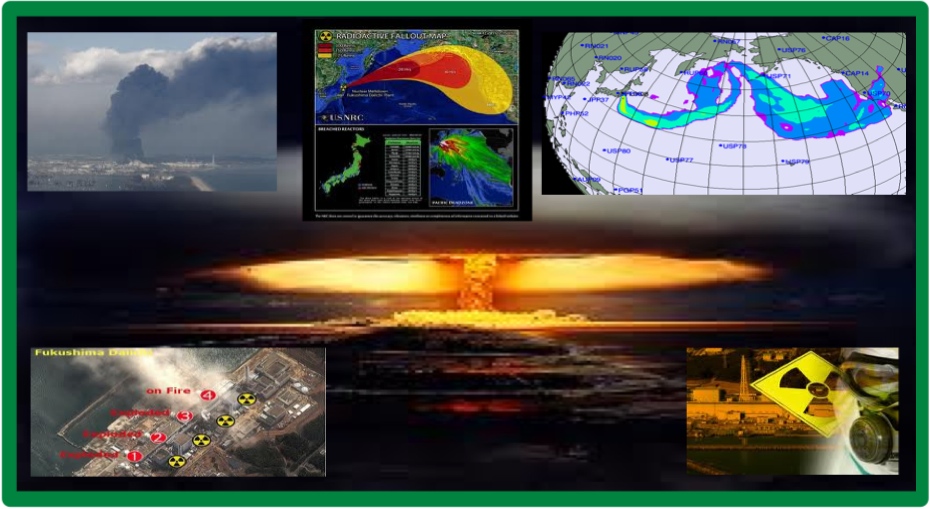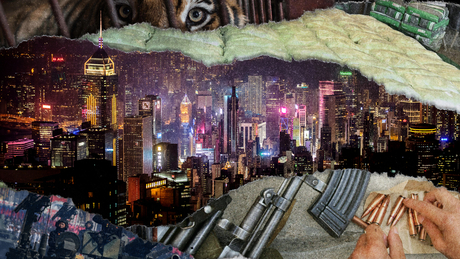
The Wan Chai connection: The Washington-accused drug lords, gun runners and dictators’ financiers tied to one Hong Kong district
By Joshua Berlinger, CNN Business, December 11, 2020
(CNN Business)The Hong Kong neighborhood of Wan Chai may be home to the most eclectic and densest concentration of US-sanctioned enterprises anywhere on the planet. In less space than a square mile, you’ve got offices tied to: an alleged financier for Hezbollah, the Lebanese militant group; an individual accused of helping Iran acquire millions of dollars of military equipment in violation of US sanctions; a man accused of helping Venezuelan President Nicolas Maduro plunder his country’s resources; and a company that allegedly opened a bank in North Korea in violation of United Nations Security Council resolutions. As if that wasn’t enough, there’s also an office tied to a powerful Southeast Asian militia and a casino mogul accused of trafficking drugs, wildlife and even humans. Walk these streets on the northern part of Hong Kong Island by day, however, and you’ll likely see well-dressed professionals out to lunch. At night, it’s twenty-somethings getting drunk in rowdy bars — not drug lords slinging kilos of methamphetamine or gun runners trying to sell crates of AK-47s. That’s because all five offices appear to be front companies. Front companies are not inherently illegal. They are legitimate corporations without significant assets or active business operations that can be used to conceal illegal or unsavory transactions, evade taxes and generally avoid scrutiny. Essentially, they are near-empty offices in tall towers seldom, if ever, visited by their owners. But the five companies all appear to exist for one reason: to evade the watchful eye of American law enforcement. Four of the five alleged front companies in Wan Chai have, since 2015, been added to the US Treasury Department’s “Specially Designated Nationals And Blocked Persons List” — a massive document that names all entities sanctioned by the US government. People or companies put on the list are generally barred from doing business with Americans, conducting transactions in US dollars and using the US financial system. Allegations against the fifth company, the one tied to the North Korean bank, were raised in 2017 by a UN panel that monitors the efficacy and enforcement of sanctions on Pyongyang. Why exactly the five are in Wan Chai — and so close together — isn’t clear. It might be as simple as the lure of a good location and cheap rent. But they’re not alone. The Center for Advanced Defense Studies’ sanctions explorer, a tool created by a Washington-based non-governmental organization that scans the Treasury Department’s sanctions list, turns up at least 13 entries in Wan Chai and more than 120 in all of Hong Kong.
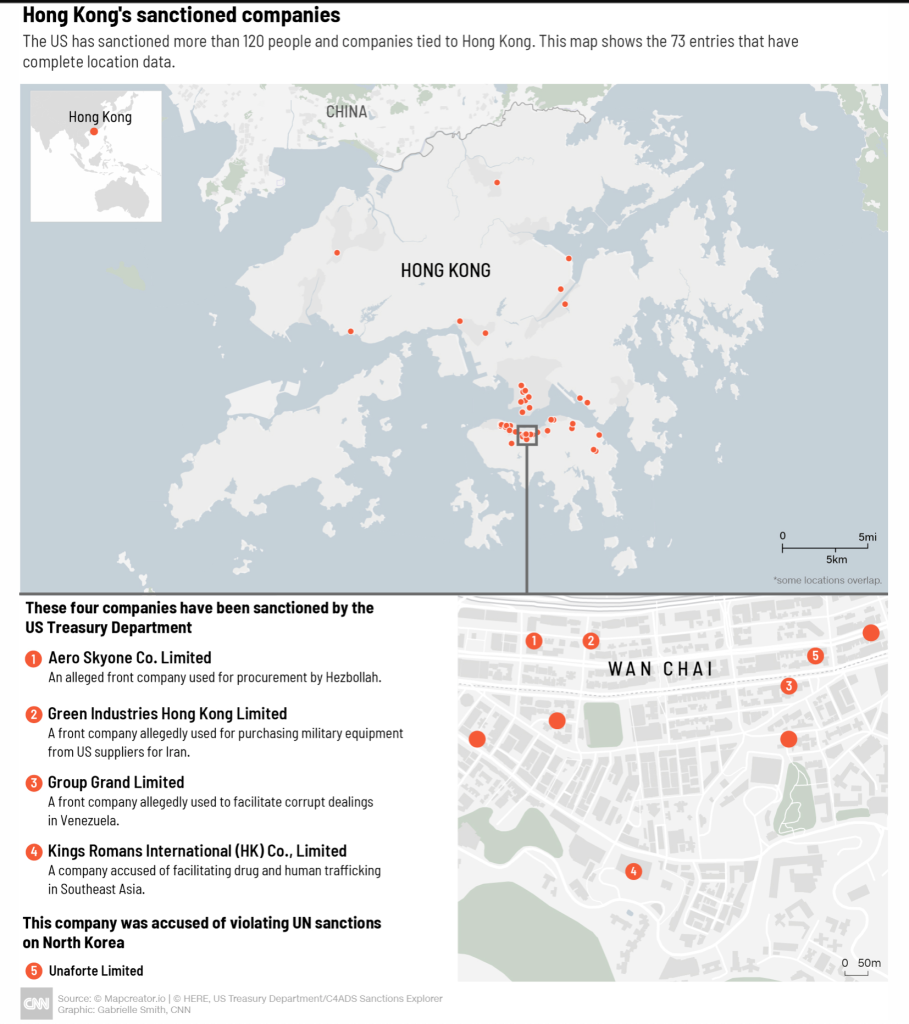
They’ve all likely flocked to the city for the same reasons that many legitimate businesses do. Hong Kong is fully integrated into the global financial system. It’s incredibly easy — too easy, some critics argue — to form a company and staff it with well-educated local employees. And, for decades, Hong Kong has wholeheartedly embraced limited economic regulation and corporate oversight. Free market, non-interventionist policies have helped supercharge the city’s economy. But financial crime experts say they have historically allowed shady businesses to pour money into the city, regardless of how it was obtained. Hong Kong’s Companies Registry, which is part of the city’s Financial Services and the Treasury Bureau, told CNN that US sanctions are “unilateral” and have no force in local law. The Companies Registry declined to make the head of the agency, Ada Chung, available for an interview. Hong Kong has passed laws in recent years aimed at curtailing malicious corporate activity, but plugging the systemic gaps that allow illicit front companies to thrive would risk choking Hong Kong’s legitimate economy, angering the city’s powerful tycoons and, in some cases, furthering American geopolitical aims at a time of intense rivalry between Washington and Beijing. It’s a balancing act the city has performed for years.
The foundation of a fortune
It was about 70 years ago when a 27-year-old Wan Chai native named Henry Fok figured out that Hong Kong’s leaders weren’t willing to stifle business to preserve the interests of governments on the other side of the planet. When Mao Zedong and the People’s Republic of China joined the Korean War on behalf of North Korea in 1950, the United States and its allies responded by instituting an economic embargo on Beijing. In May 1951, the United Nations recommended its members enact their own trade restrictions against China. Fok saw opportunity. China would be willing to pay a steeper price for everything from medicine to war materiel. All he had to do was ship the goods to them — a task for which he was well-placed. Though Fok was born poor, he had learned English in the British colony. That meant he could read local gazette auction listings and buy cheap military surplus goods left over from World War II. His first purchase was a tugboat, he told the Wall Street Journal in 1997. He had also helped his mother run a small shipping business, meaning he knew that industry. So, under the cover of night, Fok began shipping everything from asphalt to iron plates, plastic hoses, steel, gasoline and rubber tires to mainland China via Macao, which at the time was not strictly enforcing the embargo. “Whatever the mainland needed we could get it for them,” Fok wrote in his memoir, though he denied the longstanding rumors that he was a gun runner. “It was quite dangerous. But I didn’t care, if there was money to make then it deserved a try.”
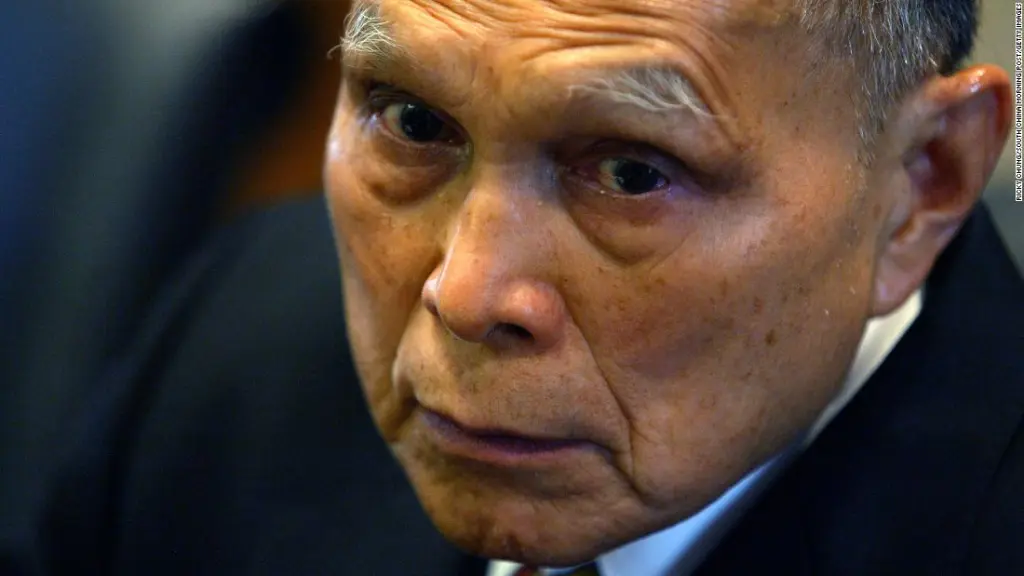
The Americans were not pleased. Washington accused its ally, Britain, of not enforcing the embargo strictly enough in its colony. The territory’s British rulers maintained they were trying, but argued against pressing too hard because the colony’s economy was built on regional trade, especially with China. Cutting that link could have spelled ruin for Hong Kong, especially given the economic pressures brought by an influx of refugees from mainland China after the Chinese Communist Party took power in 1949. So Fok and a handful of others continued with little resistance from the British, and the war in Korea raged on. The United Nations was not even 10 years old by the time the fighting stopped in 1953. The Korean War had been one of its first opportunities to use economic leverage instead of violence to achieve its ends, and even then there were people like Fok who figured out how to game the system to make money. By the time Fok died in 2006, he was a billionaire tycoon and one of Hong Kong’s most powerful political brokers. He later maintained violating sanctions wasn’t what made him rich. In fact, he said the whole operation was so stressful that by the end of the war he only weighed 103 pounds.But Fok had earned enough capital to invest in other ventures. He would go on to become the first Hong Kong businessman to buy apartment blocks and resell the uncompleted flats individually, a novel idea that made him millions. Apartments in the city are often still sold this way today. Fok also backed casino magnate Stanley Ho’s bid for Macao’s gaming monopoly in the early 1960s, which accounted for most of Fok’s fortune at the time of his death. When Fok tried to cash out of the gambling industry in the early 2000s, he was believed to be seeking between $769 million and $898 million for his shares in Ho’s company, according to Forbes. He was worth about $2 billion in 2001, according to the financial magazine, and died five years later.In the end, the measures meant to sap China’s ability to wage war had inadvertently paved the way for Fok’s fortune. His business empire was built on money made by ignoring and exploiting US and UN attempts to wield tools of economic warfare. Fok also showed that Hong Kong authorities were willing to look the other way when it came to businesses entangled in geopolitical conflicts, as long as it was good for the economy.
John Cowperthwaite’s experiment
The 1950s kicked off a half century of tremendous economic growth in Hong Kong, thanks in large part to those refugees from mainland China. Most arrived with nothing and needed jobs. Many turned out to be entrepreneurs, and the colonial government wanted to help them set up shop, according to Steve Tsang, the director of SOAS University of London’s China Institute. “So they basically introduced the most user-friendly system in the world for companies to [get] registered and just get on with business,” he said. That meant getting rid of red tape so people could easily start their own companies. This “user-friendly” system was just one cog in the colonial government’s unabashedly non-interventionist economic plan. British officials pursued a host of laissez-faire policies and let exchange rates be determined by market forces, at a time when much of the world was tying rates to the US dollar and gold. All that made Hong Kong something of an outlier globally and laid the foundation for the city’s “free market, wheeler-dealer kind of reputation,” said Catherine Schenk, a professor of economics and history at Oxford University. No one embodied this reputation more than John Cowperthwaite, Hong Kong’s Financial Secretary from 1961 to 1971. Cowperthwaite was so opposed to government involvement in the economy that he often refused to collect simple economic statistics, arguing that any data would end up being used as an excuse to intervene.
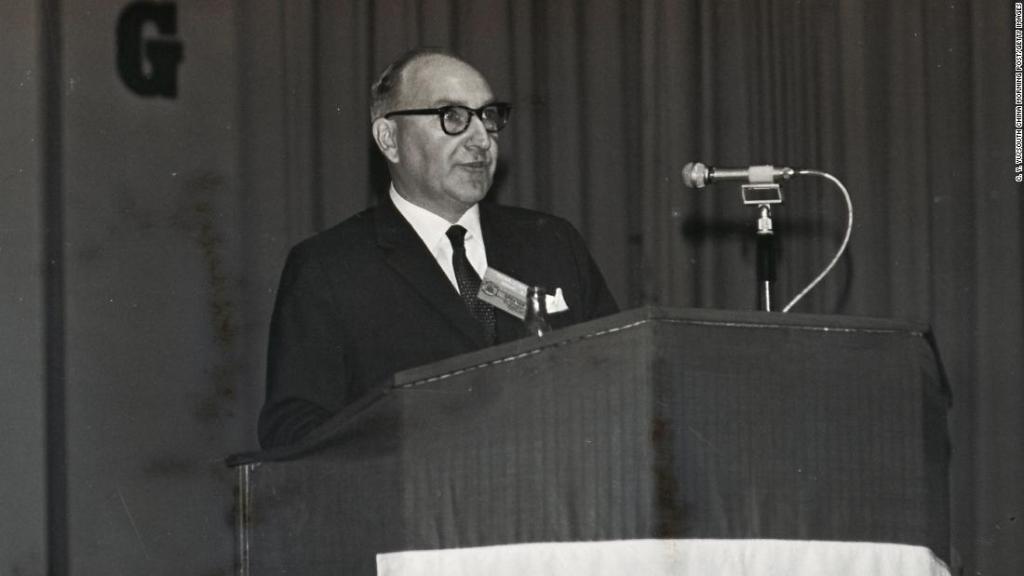
Famous conservative economists like Milton Friedman, the Nobel laureate and adviser to President Ronald Reagan and Prime Minister Margaret Thatcher, were fascinated by Cowperthwaite and his experiment in unbridled capitalism. Free marketeers credit Cowperthwaite for the colony’s impressive economic growth in the second half of the 20th century.His tenure coincided with a historic boom in the number of firms operating in the city.In 1960, there were 3,732 companies registered in Hong Kong, according to the Hong Kong Companies Registry. A decade later, there were 15,848. In that time frame, GDP more than tripled.
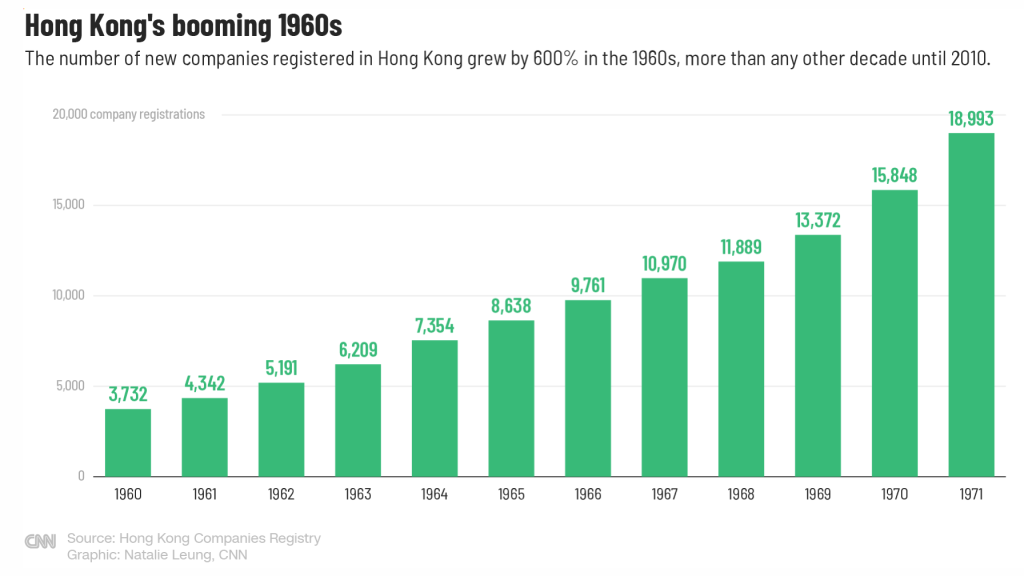
When mainland China became a hub for manufacturing the early 1980s, Hong Kong became a gateway to that industry, and a financial center. The colony did not require people to be forthright about where their money originated, nor did it tax overseas earnings. And it remained very easy to set up a company. Legitimate business owners, however, weren’t the only ones who took note. So too did the increasingly wealthy and powerful Southeast Asian heroin cartel bosses who needed a place to launder their growing fortunes.
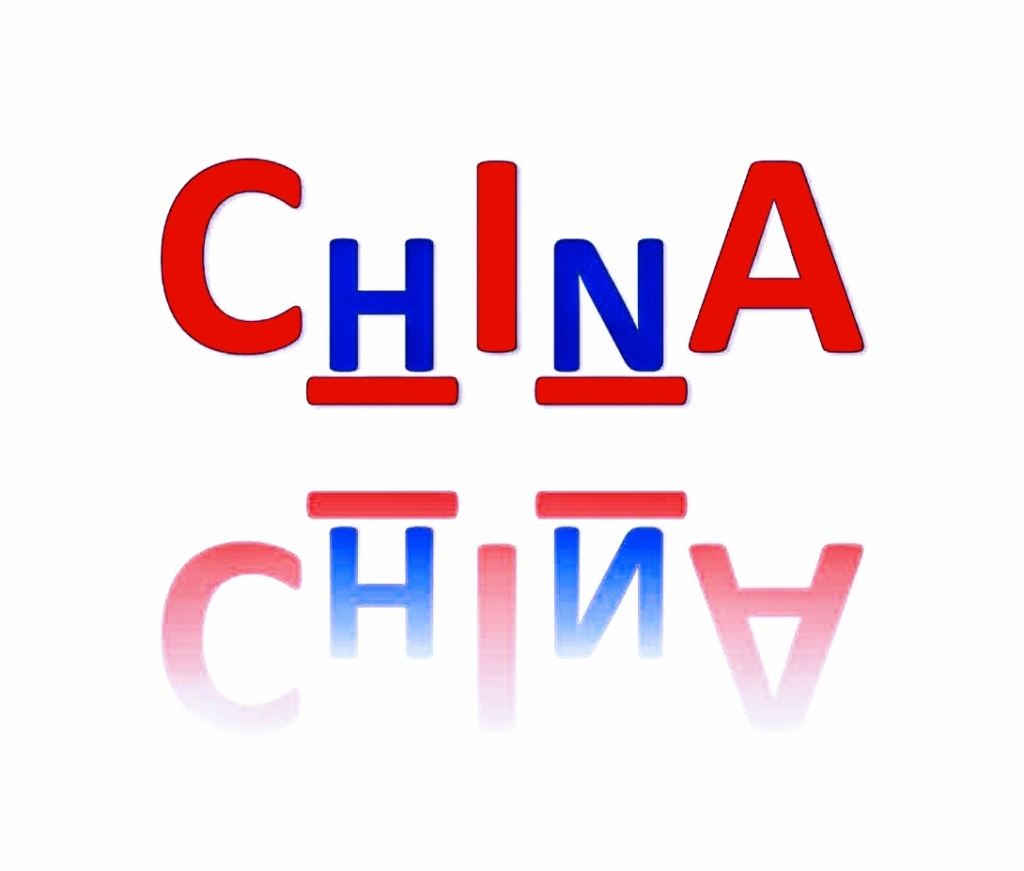
Washing money in Hong Kong
Fok may have pioneered sanctions evasion in Hong Kong. But the modern blueprint for the operations of the five front companies in Wan Chai was written in the 1980s by those heroin dealers, who used the colony’s lax financial system to clean tens of millions of dollars worth of drug money. The sheer amount of greenbacks being moved out of Hong Kong from 1982 to 1984 was massive — hundreds of millions of dollars — and it paralleled the rise in Southeast Asian heroin’s market share in the United States, according to US intelligence. And the money kept pouring in.
In 1991, Hong Kong officially sent nearly $4 billion in cash back to the United States, according Robert Koppe, an official from the US Treasury Department’s Financial Crime Enforcement Network (FinCEN).That number just didn’t make sense, and Koppe told a Senate subcommittee on Asian organized crime in 1992 he couldn’t explain it. Koppe said that FinCEN had a few theories on where the money was coming from; laundered drug money seemed the most likely. Concerns about a similar currency surplus had been raised about eight years earlier by former President Reagan’s Commission on Organized Crime, and it concluded drug trafficking was a logical explanation. There was no way to know for sure. At the time, Hong Kong did not have currency transaction reporting requirements, meaning businesses and individuals didn’t have to explain where large amounts of money were coming from. And nearly $50 billion in US dollars were being exchanged each businesses day in Hong Kong, according to Koppe. That was part of the problem itself, per Koppe. With so much cash unaccounted for in a major financial hub, Hong Kong was, as Koppe put it, “an excellent target area for the laundering of large amounts of US currency. “So law enforcement officials reasoned that if Hong Kong was sending back millions of dollars’ worth of drug money to the United States, it meant that Southeast Asia’s heroin empires were successfully laundering their fortunes through the global financial system via Hong Kong. They often used front companies to do it.
A 1994 report by the US Drug Enforcement Administration explained that traffickers would set up front companies in Hong Kong in order to conceal the movement of funds, or add layers of complexity and anonymity to their schemes. These heroin empires essentially provided a business model for shadowy operations, like the five front companies in Wan Chai. They showed them how to abuse Hong Kong’s lax system to hide money made illegally overseas.
The unassuming offices of Wan Chai
The Panama Papers in 2016 blew the lid off the murky world of international offshore finance — and showed Hong Kong was the most active place on the planet for the creation of shell companies, alongside traditional tax havens such as Switzerland, Cyprus and the US state of Delaware. The 11 million-plus document dump, leaked to the International Consortium of Investigative Journalists (ICIJ), revealed how wealthy and powerful people allegedly employed Mossack Fonseca, a Panamanian law firm and corporate service provider, to set up shell or front companies on their behalf. Mossack Fonseca denied any wrongdoing after the story broke, but the leaks helped explain how the world’s 1% can use front or shell companies to move money internationally. Such firms could conceal the true identity of a company’s owner, mask a business’ assets or monopolistic practices, or even avoid sanctions. Tycoons also use them to obfuscate their business practices.
A 2001 study found that eight major conglomerates controlled a quarter of all corporations in East Asia’s nine most advanced economies at the time, including Hong Kong. The papers caused reputational damage to the city, exposing how open its financial system and corporate services sector are to abuse.
As of the end of June 2020, Hong Kong boasted more than 7,000 licensed trust and corporate service providers. Many bear little resemblance to global firms like Mossack Fonseca. They often operate out of poorly lit offices in unassuming mid-rise buildings. Some have strange names like Cheerful Best Company Services, the business at the office tied to the North Korean bank, or Sky Charm Secretarial Services Limited, one of the three corporate service providers at the address that was supposed to house a front company accused of violating US sanctions on Iran.
“The government’s promise to uphold the principle of ‘keeping intervention into the way in which the market operates to a minimum’ is a classic see-no-evil approach to financial regulation, designed to attract offshore business, dirty and clean, with few questions asked.”
In fact, four of the five front companies that were supposed to be in Wan Chai appeared, at some point, to house corporate service providers, CNN Business found after visiting them. None of those were surprising finds. Corporate service providers are prevalent throughout Hong Kong and most offshore financial centers because they make it easy to set up and maintain a company from abroad. The fifth company, the address tied to the alleged Southeast Asian drug trafficker, was actually home to another company, Shuen Wai holdings, which was sanctioned by the US Treasury Department in 2008 amid allegations that the office was a key part of the financial network used by the a Burmese militia to launder profits from drug sales. The man who answered the door when CNN visited for a different investigation in 2018 said the company was previously involved in the jade trade but now works in funeral services.
Experts say the issue is that company registration and corporate secretarial services lack proper oversight. Fewer regulations has meant more business and a more attractive offshore center, but also more front companies like those in Wan Chai hiding in the shadows. That’s part of the reason why the Tax Justice Network, a non-governmental organization that monitors and studies tax havens around the world, ranks Hong Kong fourth on its Financial Secrecy Index. “The government’s promise to uphold the principle of ‘keeping intervention into the way in which the market operates to a minimum’ is a classic see-no-evil approach to financial regulation, designed to attract offshore business, dirty and clean, with few questions asked,” the index said. The Hong Kong government hasn’t sat idly by. It has tried to find a legislative fix that doesn’t involve onerous regulation, but to date, most of its efforts have focused on the banking sector.
Stringent due diligence and know-your-customer requirements are now the norm at banks because “the cost of not observing the rules and regulations [on] money laundering is very high,” said Simon Lee, the co-director of the International Business and Chinese Enterprise Program at the Chinese University of Hong Kong (CUHK). In 2018, Hong Kong’s government passed laws aimed at clamping down on illicit company formation. The new legislation requires corporate service providers to be licensed and registered, and all companies and service providers must now keep on hand information regarding beneficial ownership, or the actual people behind any company.However, the efficacy of these new rules remains to be seen. The Financial Action Task Force, a global anti-money laundering watchdog, said in its 2019 evaluation of Hong Kong that the territory had “a strong legal and institutional framework” for combating financial crime, but noted that corporate service providers were not well supervised “until very recently” and more time was needed to gauge just how effective the new laws are.
The future
Today, American sanctions in Hong Kong face a new major test.On August 7, the US Treasury Department sanctioned 11 people — including Carrie Lam, the leader of Hong Kong — for their role in enforcing a new national security law imposed by Beijing which effectively stamps out government dissent and freedom of speech. Supporters of the legislation said it was needed to protect the city after months of political unrest in 2019, which at times turned violent. Critics say the measure is a brazen attempt by China to take greater control of Hong Kong’s affairs. Hong Kong was for years seen as a stable, rules-based business mecca with a world-class judiciary to settle disputes. That veneer of respectability has been tarnished, in large part by the national security law, which gives Beijing far more influence over Hong Kong’s legal system. Washington believes the law was abhorrent enough to warrant putting Lam on an American blacklist alongside North Korea’s Kim Jong Un, whose country is accused of running gulags that house more than 100,000 political prisoners; Min Aung Hlaing, the Burmese general accused of orchestrating a genocide in Myanmar’s Rakhine State; and Syrian President Bashar al Assad, who has allegedly deployed chemical weapons against his own people.
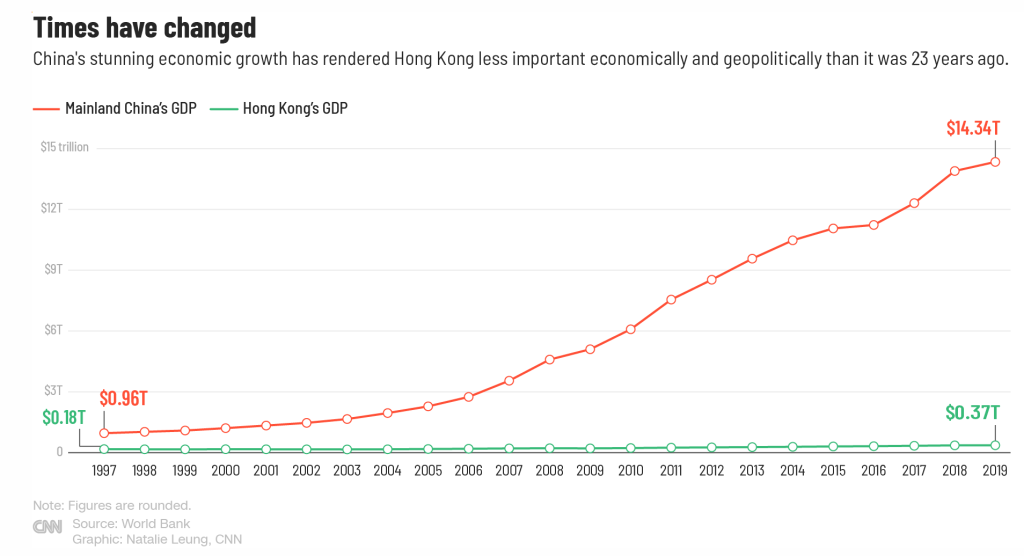
Though Lam called the sanctions “nonsense” in an interview with Chinese state media and joked that the US government got her address wrong, they have left her hamstrung. Lam told the Hong Kong International Business Channel in late November that since they were put in place, she has not been able to use banking services in Hong Kong.”I’m using cash every day,” she said. “I have piles of cash at home. The government is paying me cash for my salary, because I don’t have a bank account.” She clarified in another interview that only part of her salary is being paid in cash — she is leaving the rest in the Hong Kong Treasury.
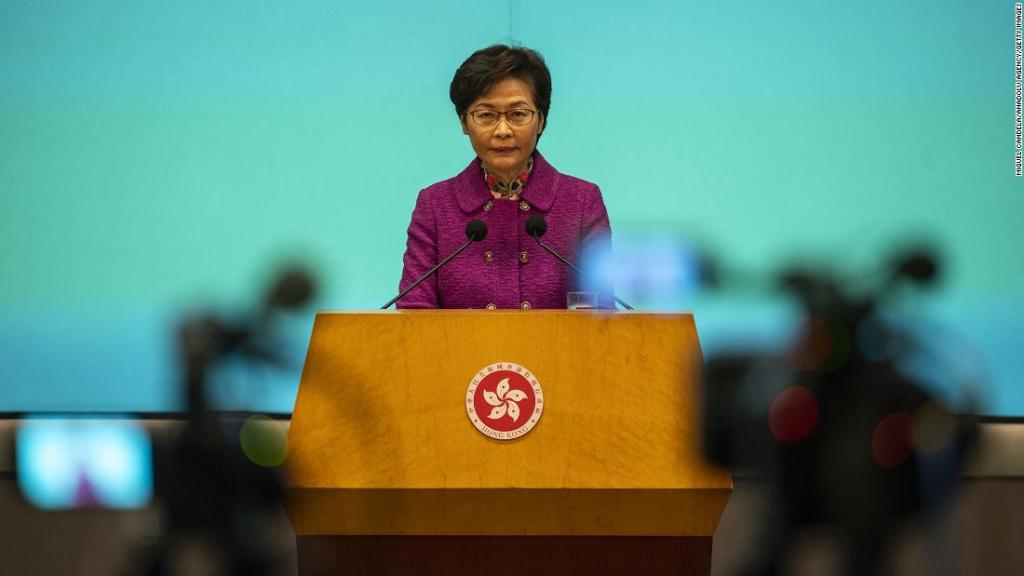
Lam was the target of an American tool of statecraft and an economic pressure campaign. Other governments, however, are not required to follow Washington’s lead on sanctions, even if the measures target apolitical crimes like drug dealing. A spokesperson for Hong Kong’s Companies Registry, which oversees the city’s companies, said as much when asked about the five front companies in Wan Chai. “While we do not comment on individual cases, you will appreciate that unilateral sanctions have no force in international law and do not create any legal obligations for other jurisdictions to follow,” the spokesperson said.The official reaction toward the sanctions against Lam have struck a similar but more combative tone. Hong Kong’s government denounced them as a“deplorable move [that] is no less than state-sanctioned doxxing.” With Hong Kong moving closer into Beijing’s orbit and China’s overall relations with Washington particularly fraught, there isn’t much chance the city will be inclined to help the United States enforce sanctions — especially when Carrie Lam can’t even open a bank account because of them. That is good news for the five Wan Chai front companies, and others like them. As long as Hong Kong’s leader remains sanctioned, it’s unlikely authorities here would be willing to cooperate with Washington to plug the gaps that make it so easy set up a front company in Wan Chai.
© 2020 Cable News Network. A Warner Media Company. All Rights Reserved. CNN Sans ™ & © 2016 Cable News Network.
Reference link: https://edition.cnn.com/2020/12/10/business/hong-kong-front-companies-intl-hnk-dst/index.html


